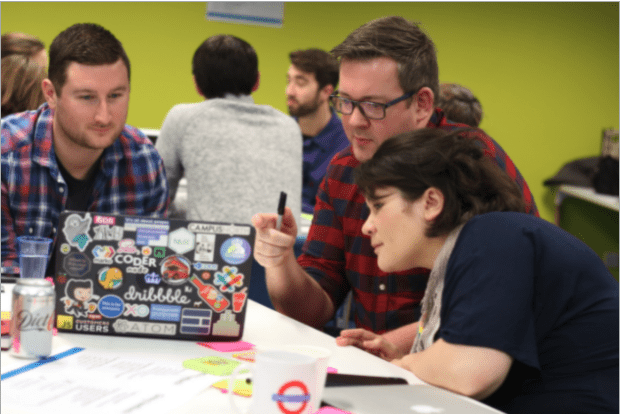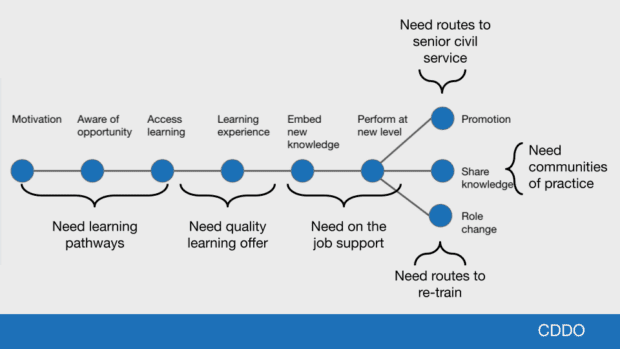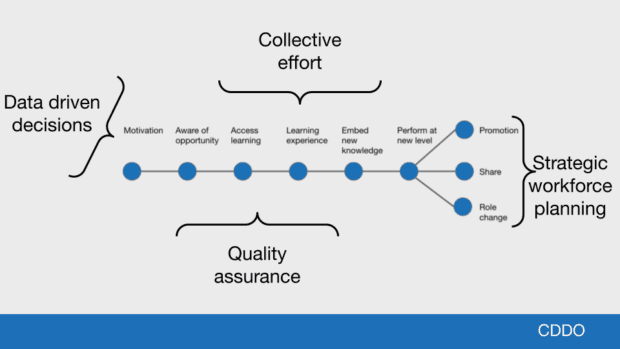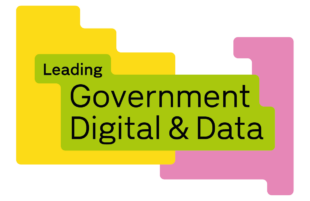
The DDaT Capability Team in the Central Digital and Data Office (CDDO) powers digital transformation by ensuring that government has the right people to develop and deliver excellent services for users.
We are here to tackle the biggest challenges facing the profession through:
- steering collective effort on complex challenges
- using data-led insight to prioritise cross-government activities
- providing resources and expertise dedicated to scaling best practice
- embedding DDaT capability in wider CDDO responsibilities of standards assurance and digital strategy
Working in the open
We have mission teams to provide support for civil servants in different stages of their DDaT career, and with different levels of DDaT knowledge requirements.
These are:
- People new to DDaT roles
- People established in DDaT roles
- Non-DDaT civil servants
This post is from the team focused on supporting folks who are already established in DDaT roles. It outlines the challenge as we understand it, our approach and initial recommendations to take forward.
We are working in the open as an invite to join us on the journey.
The challenge
“DDaT is a relatively young profession that started forming in government in 2015. It has achieved a lot to date, and people in DDaT roles are now increasingly motivated to have the opportunity to implement their creative ideas at scale, via roles in senior leadership.
To accelerate this journey, we need to ensure that there is consistent access to effective learning, and support to develop and apply new skills in all roles. For example, this means ensuring that DDaT professionals can prioritise long term learning over short term delivery, to enable them to progress to the very top of the civil service.”
Jenny O'Connor, Head of DDaT Capability, CDDO
How we are tackling the challenge
We are breaking down our approach to change in two ways.

Firstly, we will transform the whole progression route for a single role. Going in depth to tackle all the challenges we know about (and probably some we don’t!) end-to-end. This is a live lab approach to piloting and iterating solutions, learning in practice what works, before scaling across more roles in the DDaT profession.

Secondly, we are looking at common challenges for all roles across the profession. Going wide to tackle challenges that we are best placed to make impact on from CDDO.
The recommendations
In order to get to this point we:
- reviewed existing user research
- interviewed 15 capability leads and DDaT heads of role
- built a list of common challenges
- created and shared early hypotheses
- collectively iterated and prioritised the hypotheses
- built basic prototypes based on this prioritisation
- user tested the prototypes with 26 capability leads and DDaT heads of role
- analysed themes
The recommendations coming from this process are:
- Increase support for the cross-government community of capability leads and experts. To find and scale good practice and learn from other professions’ approach.
- Transform the progression path for Delivery Managers followed by Software Engineering. To build successful exemplars to scale.
- Collaborate with an existing cross-government working group to build more DDaT learning pathways. To reduce duplication and benefit from collective knowledge.
- Improve the quality of learning on offer for DDaT professionals through Civil Service Learning (CSL) to get best value for current spend.
- Understand better the landscape of formal learning purchased outside the CSL framework. To explore opportunities to scale good practice or further improve the CSL offer.
- Create a new line of discovery on how best to boost informal learning that embeds new skills and provides on the job support. Likely to include communities of practice and coaching. (Currently on backlog, which means we will tackle it after the points above).
- Test whether data from separate skills self-assessment tools being commissioned by departments can be usefully aggregated. To understand skills profiles and learning needs from a profession-wide view. (Currently on backlog).
- Further explore commissioning a single skill-self assessment tool for the profession. Pilot adoption by learning from departments already doing it. (Currently on backlog).
- Further explore viability of maintaining a multidisciplinary product team to manage the governance and publishing for collectively built learner pathways. (Currently on backlog).
- Prioritise non-DDaT line managers of DDaT professionals for the mission to increase non-DDaT professionals knowledge in this domain. So they can better support and signpost progression opportunities to their DDaT line reports. (Currently on backlog, prioritising senior civil servants first).
- Further explore blockers to DDaT professionals entering senior civil service. (Currently on backlog).
Get involved
This is all work in progress. If you would like to get involved you can:
- sign up to the monthly newsletter for updates and invites to take part
- email the team directly on ddatprofession@digital.cabinet-office.gov.uk

2 comments
Comment by James Cattell posted on
I'm fascinated by recommendation 6, especially the communities of practice bit.
How can I get involved, please?
I edited some related guidance for GOV.UK which you can view via https://www.gov.uk/government/publications/community-development-handbook/community-development-handbook
Comment by Laura Billings posted on
Hey James - thanks for getting in touch and sharing the guidance. The recommendation comes from user feedback that formal learning is only part of the picture. Using the 70-20-10 model, 80% of learning comes from on the job experiences and interactions with others. We also know from a recent discovery on re-training that on the job coaching will be important.
The question then becomes, what specifically is the CDDO's role in all of this to create the most value? Potentially supporting government departments and agencies to adopt communities models. Potentially helping to steward the cross-gov DDaT communities. Potentially adapting the availability of coaching via Civil Service Learning to be effective at practitioner level as well as executive level.
It's on the backlog at the moment, because we can't tackle it all at once. As soon as we've got resource to pick it up, we'll let everyone know. In the meantime folks, if you are interested in learning about or setting up communities of practice, follow James's link above.